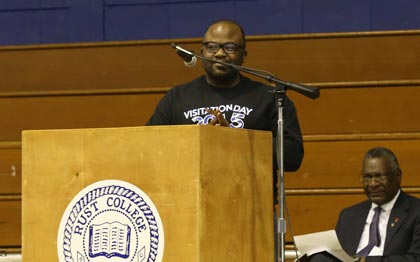When Braque Talley injured his leg while playing high school football, the resulting bum knee turned out to be a lucky break for him.
“Throughout high school,” he says, “I did not focus much on academics. I was planning on football to get me in and out of college. I had plans to go to Alcorn State University [Lorman, Mississippi] to play football.”
After Talley hurt his knee, however, his pastor, the Rev. Roosevelt Gage, a Rust College alumnus, told him, “Let me take you to Rust and show you what a good United Methodist education can do for you.”
“Rust College accepted me on the spot,” Talley recalls. “I had a chance to meet the president, and from that point on, I knew I was at home.
“I loved my college experience. Being at a small campus that is God-centered – where everyone from the president to the custodial staff took a personal interest in ensuring the success of all students – spoke volumes to me.”
Rust, he says, “gave me a chance to excel when most colleges had shut their doors on me. My parents taught me to be responsible for myself. Rust taught me to be responsible for all of God’s people – that ‘Rustites’ have an obligation to be all that God has called them to be.”
 |
| 2015 annual high school visitation day. It's the largest recruitment day in the school’s history. In 2014, my first year at the college, we enrolled the largest class ever in the college’s history. (seated Dr. David Beckley, President, Rust College) |
Talley’s life goals evolved at Rust. “I decided that I wanted to study political science pre-law and become a criminal attorney,” he remembers.
A turning point for Talley occurred when he became a Lina H. McCord ambassador, promoting the United Methodist Black College Fund. “Through my participation,” he says, “my goals changed from being an attorney to being a college administrator.” Talley admits he would like to become the youngest black college president.
Talley and his sister grew up in rural Mississippi. “My mother, an educator, and my father, a common laborer, were very tough and set very high expectations,” Talley says.
His sister died of cancer at age 29. “My grandmother died a month before my sister,” Talley says. “I was a senior at Rust College. This was the toughest challenge my family faced.”
But Rust kept Talley on track.
“Rust College saved my life and would not have been able to support me if it had not been for The United Methodist Church,” he says.
“The Black College Fund is more important to the vitality of our schools than ever before. Because of it, students are provided the opportunity to go to college and become independent, productive citizens of today’s society. With Black College Fund schools, I am sure that many of the 16,000 students that this fund supports would not be able to go to college and contribute to the global society.”
Today Talley is dean of enrollment services at Rust. An executive reporting directly to the president, he is responsible for recruitment, admissions, financial aid, default management and career services. He travels often to meet with recruits, high school counselors and community organizations.
“When I am in the office,” Talley says, “I am usually ensuring we are operating at 100 percent to serve our students, recruits and graduates. My job allows me to make a difference daily, as we often deal with first-generation students who are changing their family dynamics.”
Barbara Dunlap-Berg, general church content editor, United Methodist Communications
One of seven apportioned giving opportunities of The United Methodist Church, the Black College Fund provides financial support to maintain solid, challenging academic programs; strong faculties; and well-equipped facilities at 11 United Methodist-related historically black colleges and universities. Please encourage your leaders and congregations to support the Black College Fund apportionment at 100 percent.





